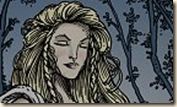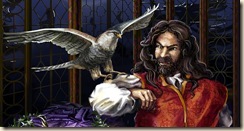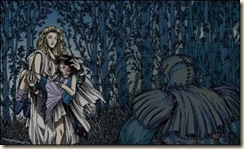(Note from Scott—this is a repost of an essay written by Edmund Schubert on MagicalWords.net.)
There are several topics that flare up with a certain amount of passion from time to time on the internet, sexism and racism being foremost among them. These are important topics that ought to be discussed, and while I think most start out as well-meaning exchanges, they often deteriorate into exercises in frustration. Someone will make a comment, to which someone else will reply, “That’s racist.” What the second person meant was, “That’s a racist comment,” but often times it’s not what was actually said. The person on the receiving end of that comment will then get indignant and reply, “I not a racist!” and off we go to the racist debate races.
Overall I think the science fiction and fantasy community is one of the most open-minded communities I know of—we’ve all heard numerous times how the first interracial kiss on network television took place on Star Trek, between Kirk and Uhura—but at the same time, to say that there is no racism or sexism would be so ridiculous as to render the speaker of such nonsense as a fool or a liar.
Last night I got an email from one of my assistant editors, who said that there’s another kerfuffle (his wonderful word) going on about sexism in SF and F, and out of curiosity, he went back into his records and crunched some numbers to see where he stood. He admitted he “was actually kind of worried that the exercise might reveal some sort of imbalance that might reflect unconscious bias on my part,” but he was interested enough to pursue the numbers, no matter where they led. I have to give him a lot of credit for looking the issue squarely in the eye despite his concerns.
This naturally led others on the team to do the same. It took a while to compile all the numbers, because no one on the team actually tracks them on an ongoing basis (with the one exception that I do track the gender of what we actual publish. However, with submissions, I would very much prefer the assistant editors focus first on the quality of the story and not the gender of its author). Having said all that, here’s the breakdown, by assistant editor:
1)
“I just went through and did the numbers for all the manuscripts I pulled from the regular slush, which gives the following additional information:
Male authors: 135
Female authors: 69
Again, an almost 2:1 ratio of male to female submitters. (Just to check, I looked at the names on the most recent 100 submissions through the regular slush, and for the clearly gendered names, the male to female ratio was 56:27, so 2:1 seems to be about what we get.)
With these, I just did straight rejection/non-rejection..
Rejection rate for males: 72.6%
Rejection rate for females: 76.8%
A difference of 4.2%, which isn’t all that significant: if I switched just 3 female manuscripts from rejection to non-rejection, the rejection rate for females would have been lower than for males.
Adding the earlier group in with this group:
Male authors: 328
Female authors: 176
Rejection rate for males: 53.7%
Rejection rate for females: 55.0%
For a total of 404 manuscripts, a difference of 1.3% between male and female rejection ratios.”
**********
2)
The next set of numbers ran thusly (with a third category added for people who submitted stories under names that are sexually ambiguous, i.e. R.T. Morganfeld, or Pat Frantella, so ‘O’ is for ‘other’):
“Total Count: 659
By Gender:
F 184 27%
M 411 62%
O 64 9%
Next Action
F Recommend 26 14%
F Reject 158 86%
M Recommend 84 20%
M Reject 327 80%
O Recommend 9 14%
O Reject 55 86%”
**********
3)
“In honor of the latest kerfuffle on the interwebs about sexism in SF, I went through all the submissions sent to me that I have responded to (excluding the ones that were sent in large batches at the very beginning of my tenure.)
Male author: 193
Female author: 102
Male/Female co-authors: 1
Undetermined: 5
So male author submissions outnumber female author submissions almost 2:1.
What about disposition? I have 4 possible dispositions: Highly Recommended, Recommended, Borderline, Recommend Rejection.
Recommend Rejection rate for males: 40.4%
Recommend Rejection rate for females: 40.2%
Borderline rate for males: 28.0%
Borderline rate for females: 28.4%
Recommended rate for males: 29.5%
Recommended rate for females: 26.5%
Highly Recommended rate for males: 2.1%
Highly Recommended rate for females: 4.9%
Until I went through and counted up these figures today I wasn’t keeping track of my rejection rates at all, let alone by sex. I was actually kind of worried that the exercise might reveal some sort of imbalance that might reflect unconscious bias on my part, but the numbers are remarkably balanced.”
**********
My own contribution to these numbers comes in the form of actual publication numbers. Going back to the beginning of 2008, IGMS has published (or bought and is waiting to publish) 93 stories total, 65 of which were written by men, 28 of which were written by women. Not a perfect 2:1 ratio, but close enough to satisfy me. And to be extremely clear on this subject, I am not in any way, shape, or form, suggesting that we ought to be publishing twice as many male authors as female authors. I can’t control the number of submissions I get from any group or gender; I’m just saying we publish them at about the same ratio that we receive them.
The funny thing (to me, anyway) is that I didn’t really need to see the numbers to know we had a good balance; I could tell by the reactions from readers. I’ve received angry emails from female readers who are convinced we are running a sexist magazine that discriminates against women (here’s a tip for you: getting into a ‘dialogue’ with these kinds of people, trying to convince them you don’t have secret sexist editorial policies, is a fool’s errand), and I’ve also received angry emails from male readers complaining about how I’m always publishing “feminist fiction that tells men women can do whatever they want and the men just have to shut up and take it.”
I figure that as long as I’m equally pissing off both sides, I must be fairly close to getting it right.
So that’s one editor’s experience, along with a peek at the behind-the-scenes numbers. Obviously I can’t speak for the genre as a whole, so I’m curious to hear what the rest of you think, and what experiences you’ve had in this area.
--Edmund Schubert,
Editor, InterGalactic Medicine Show
PS: The numbers presented above under #1 and #3 actually came form the same assistant editor, but were regarding his reading different slush piles. We have different avenues of submission for writers with different degrees of experience and this particular editor reads from both piles.












